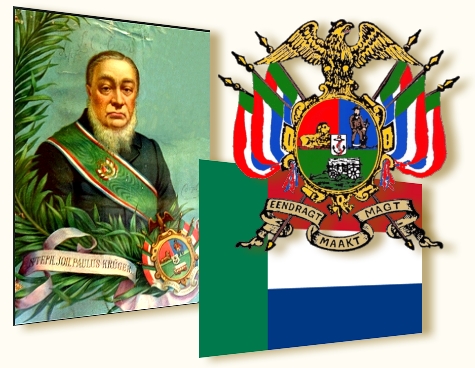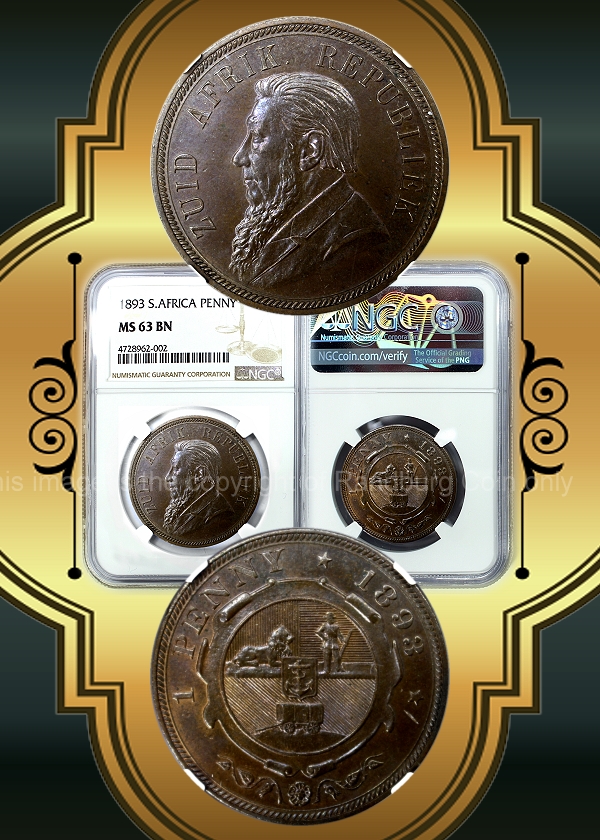1893 ZAR Paul Kruger Penny graded MS63 Brown
|
|
|
FANTASTIC FRIDAY OFFER |
|
TAKE ADVANTAGE OF OUR HAVE IT NOW CALL TO CONFIRM - +27 (0)11 789 2233 ------------------------------ PAUL KRUGER OF THE ZUID AFRIKAANSCHE REPUBLIEK
---------------------------------------------------------------------------------------------- THIS PENNY IS NOW MADE AVAILABLE OF PAUL KRUGER'S ZUID AFRIKAANSCHE REPUBLIEK ---------------------------------------------------------------------------------------------- 1893 ZUID AFRIKAANSCHE REPUBLIEK 1 PENNY N G C SLABBED AND GRADED COIN A WELL GRADED PENNY: PRICE FOR THE UNCIRCULATED COIN OWN THIS HISTORIC COIN NOW RARELY OFFERED IN A MEMORABLE COIN
---------------------------------------------------------------------------------------------- coin images strictly copyright of Randburg Coin Don't miss this price opportunity ------------------------------------------------------------------------ Details: 1893 Z A R KRUGER 1 PENNY GRADED MS 63 BROWN Metal: Bronze 0.075 Mass: 9.45 grams Diameter: 30.80 mm Description:
Paul Kruger (Stephanus Johannes Paulus Kruger) was born on October 10 1825 at his grandfather's farm, Bulhoek in the Steynsburg district and grew up on the farm, Vaalbank. He wasn't a well educated man and only had three months formal education. Growing up in a rugged farm area he learnt a lot about the wild. When the Great Trek started in 1836, Kruger's father, Casper Kruger, joined the trek party of Hendrik Potgieter and the family moved to what later became known as Transvaal, to try to establish an independent state. Settling in the Transvaal Paul Kruger's father decided to settle in an area now known as Rustenburg. At age 16, Paul Kruger was entitled to choose a farm for himself. He chose a farm at the base of the Magaliesberg Mountains and settled there in 1841. In 1842 he married Maria du Plessis and the couple moved to the Eastern Transvaal. Paul Kruger and his small family later returned to Rustenburg and Kruger's wife and infant son died soon after. It is presumed the double death is likely to have been caused by Malaria. Paul Kruger then married Gezina du Plessis, who bore seven daughters and nine sons and died in 1901. Many of Kruger's children died in infancy. Kruger emerges as leader Later Paul Kruger's strong leadership qualities started emerging. He eventually became Commandant-General of the then South African Republic, later known as Transvaal. His leadership skills became more prominent when he was appointed member of a commission of the Volksraad the Transvaal Republican Parliament who were tasked with drawing up a constitution. His leadership ability started to attract attention. It is said that he later played a prominent role in ending the quarrel between the Transvaal leader, Stephanus Schoeman, and M W Pretorius. Vice-President 1874 Paul Kruger resigned as Commandant-General, in 1873 and took no political office for a time. He retired to his farm, Boekenhoutfontein. His stint away from politics only lasted a year the next year he was elected to the Executive Council. Shortly after that he became Vice-President. Kruger's life remained heavily centred around politics from 1877 till 1882. In this time Paul Kruger led a resistance movement and became leader of a deputation. The first Anglo Boer war was 1880 and the British forces were defeated in a battle at Majuba in 1881. At this time Paul Kruger was instrumental in negotiations with the British, which later led to the restoration of Transvaal as an independent state under British rule. In 1882, the 57 year old Paul Kruger was elected president of Transvaal. He left for England in 1883 to revise the Pretoria Convention of 1881, an agreement which was reached between the Boers and the British that ended the first Anglo Boer War. Paul Kruger acquired many allies in Europe during this time. In Germany, he attended an imperial banquet at which he was presented to the Emperor, Wilhelm I, and spoke at length with the renowned Bismarck. The Discovery of gold The discovery of gold in the Transvaal, changed the political climate of the Witwatersrand. Many goldseekers from around the globe flocked to Africa. The Transvaal Republic regarded gold seekers as 'uitlanders' (foreigners). Jameson raid Kruger's leadership was put to the test at the end of 1895, when the Jameson Raid took place. The Jameson Raid led by Doctor Starr Jameson. Jameson later became premier of the Cape of Good Hope Colony, or the Cape Colony as it is now called. In December, 1896 a group of this unsuccessful raid, started the breakdown of good relations between the British and the Boers and this breakdown of relations ultimately led to the second Anglo Boer War. Kruger was elected as president four times, his last re-election was in 1898. The Anglo-Boer war The second Anglo-Boer War, also known as the South African war, started on October 11, 1899. Paul Kruger attended the last session of the Volksraad and on 29 May, fled from Pretoria as Lord Roberts advanced on the town. He remained underground for weeks and eventually, he took refuge with his European allies, while the war continued. In October 1900 he left from Lourenco Marques and Dutch Queen Wilhelmina sent the battleship, De Gelderland, to transport him. Gezina Kruger was very ill when the party left and could not accompany him. She died on 20 July 1901. Kruger's party landed in Marseilles. He travelled through Europe to Holland where he stayed for remainder of the war. His last respite was at Oranjelust in Utrecht and it was here that he received the news that Treaty of Vereeniging had been signed. Paul Kruger moved to Clarens in Switzerland where he stayed for the last six months of his life and died on 14 July 1904. He was buried on 16 December 1904, in the Church Street cemetery, Pretoria. ------------------------------------------------------- Call Randburg Coin Now (011) 789-2233 or (011) 789 -2234 KINDLY NOTE: Payment methods we accept on this promotion are - bank transfer or cash on collection |





